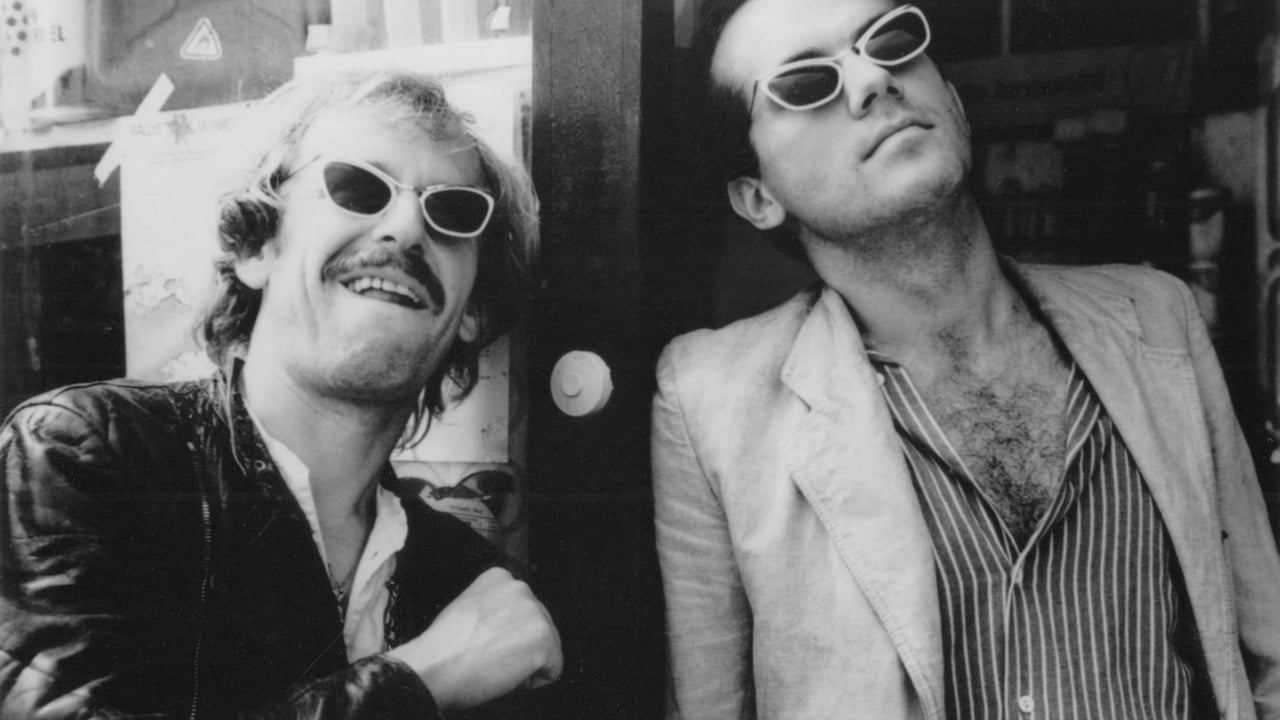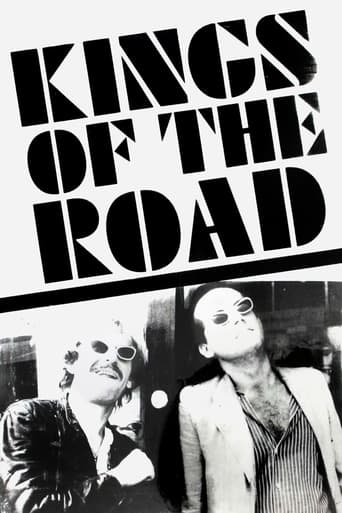

"Everything has to change". This is the good-bye message which character Robert leaves to character Bruno after a few days of joint traveling through the 197ies West German countryside. Actually, not traveling: Bruno works as an independent cinema equipment repairman who visits small town cinemas to check their projector stuff and took Robert as a passenger after witnessing his rather clumsy suicide effort. Both are somehow reluctant (or unable) to really get involved with life and other people. They seem to have plenty of time, no hurry for both of them. And thus this movie proceeds at a snail's pace. Tormenting it felt sometimes and I was thankful for the "pause" button of my DVD player. "Kings of the road" was shot in 1976 West Germany. Watching it in 2017 felt really odd to me. Nowadays' motto sounds rather like 'modernize or tear down' - 'keep a tight schedule' - 'time is money' - 'everyone for himself' etc. - well, you know. 7,5 (=8) of 10 anyhow for remarkably beautiful takes (mind the side view mirrors!) and very adequate last minutes. In general, the combination of visually stunning shots and a rather dragging storytelling might actually strengthen the sustainable impression this movie is able to produce - if you can bear watching it all through.
... View MoreProjection engineer Bruno Winter is pulled up alongside the River Elbe, as he sets about giving himself a shave a Volkswagen drives straight into the river in what seems to be a half hearted suicide attempt. The driver of the Volkswagen is woman troubled Robert, after getting to the river bank he finds Bruno to be a most interesting person, and the pair then set off on a road trip that will shape their respective lives and outlooks considerably.Shot in 11 weeks between July 1st and October 31st 1975, Im Lauf der Zeit is now considered to be one of the seminal pictures of New German cinema. Director Wim Wenders and his crew set off along the Zonenrandgebiet with only an itinerary set in concrete, working completely without a script, his lead actors, Rudolf Vogler & Hanns Zischler manage to produce one of the most thought provokingly intelligent road movies to have ever been made.There are many musings on this picture across internet forums, and although the film has very deep meanings, I really feel that it's down to the individual viewer to align themselves personally with our protagonists to get the most from the piece. Wenders clearly had deep feelings for German cinema, and here as the guys move from town to town, on Bruno's projection repair route, the feeling that film in this country is dying is quite palpable. This all ties in with the theme of change that is the core essence in Wenders film, it's not just our characters who need to wake up to the need for change, it's essentially his home country as well.As the guys move on they meet people, they drink, talk, even fight, and it's all filmed in real time, we are forced to be part of this unlikely friendship, be it washing or shaving, or the act of defecating, it's all humane and sits perfectly as a normal way of life. Come the ending, after nearly three hours of engrossing cinema, we know what has been identified, not just for our two wonderful characters, but for all of us who may be wary of change. The black and white photography from Robby Muller is excellent, and manages to make the various landscapes the guys travel thru an extra character, but ultimately it's just one of a number of things that make Im Lauf der Zeit a truly smart film. My hope is that any newcomers to the film will get as much from it as I did, maybe something different perhaps? But at the very least a recognition that this is a truly wonderful picture. 9/10
... View MoreWim Wenders's "Kings of the Road" differs from most road movies insofar as it does not quite conform to the conventions of the genre - a setting out, a journey and an arrival. Its two protagonists, Bruno, a cinema equipment maintenance mechanic and Robert, a pediatrician, have already commenced their journeys before the film begins and there is no clearly defined destination at the end. True, their initial encounter marks the beginning of a developing friendship but Wenders does not seem to be particularly interested in where it will take them, rather is it the minutiae of the journey itself that is all important. With a running time of three hours in which very little happens, it would be easy to dismiss the film as self-indulgent. But this would be to miss the point, which is a recreation of the rhythm of everyday life. In the case of Bruno we are aware of every little thing he does. He climbs naked out of his van. Later we watch him shave, and at one point we see him defecating in an open landscape in a middle distance shot held for as long as the act takes. Appropriately there are no such candid camera shots of Robert. He is an altogether more complex and private person. Estranged from his wife, he is clearly on the cusp of suicide when we first meet him. Playing "chicken" by closing his eyes while driving, he ends up in the river. He climbs out of his immobilized vehicle unaided, to be helped on his way by Bruno who is the only witness to the misadventure. The couple barely talk for some time, but a bond of friendship gradually develops between them so that Robert becomes Bruno's companion during his tour of cinemas in small towns on the East/West German border. And that is about all there is to it really. Except that the very feel of the flat landscapes, the river, the open road, level crossings and seedy cinemas takes one over, so that one hardly notices the minutes ticking away. This journey may be of little consequence but Wender's acute eyes and ears for detail make it one well worth taking.
... View MoreWatching this film is like having a satisfying meal. You feel completely nourished by the end of it, both mentally and physically. For me this film has many moments in it that drift back to me sometimes during my life. It is a tender story about the friendship developed between two men who are both wandering, both avoiding life yet experiencing things that others miss out on. They are both very free spirits yet bound by something, one by the truck , the other by his past, where he is from. They meet by chance and enjoy their company until they must part. Nothing is forced in the film and the relationship does seem to run a very natural course. A great thing about this film is that there is little dialogue in it and yet it does not impede the story flow. I like so much about this film. I read a book on Wenders a while back and I remember something he said. It was that the sensation of travelling is much more preferable to that of arriving or departing. For me this film is that. It is a feeling. One of my favourite moments is when Robert is in the back of the truck and he stares up at the moon through the skylight in the roof, his face staring at it as though it is the first time he has ever really looked at it. His eyes are open finally. It is extremely moving. A life affirming film that everyone should see. I adore it.
... View More